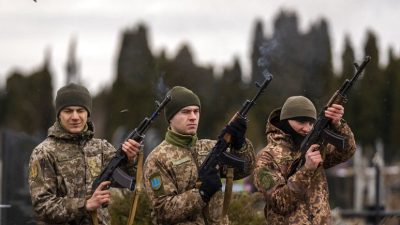Kiev’s Military Official Believes Conflict Will Go Beyond Ukraine

All Global Research articles can be read in 51 languages by activating the Translate Website button below the author’s name.
To receive Global Research’s Daily Newsletter (selected articles), click here.
Click the share button above to email/forward this article to your friends and colleagues. Follow us on Instagram and Twitter and subscribe to our Telegram Channel. Feel free to repost and share widely Global Research articles.
***
Kiev’s officials continue to spread baseless narratives about the conflict, predicting that hostilities tend to expand to other territories in Eurasia, as the fighting has supposedly become a “war of resources”. Although there is a real risk of the conflict spreading to other regions, the rhetoric is wrong and this narrative helps to spread anti-Russian paranoia.
Lt. Col. Sergey Naev, commander of the Ukrainian Joint Forces, revealed his thoughts during an interview with ABC News. For him, with Russian stability and decreasing military support for Kiev, Moscow could go beyond Ukraine in its military maneuvers, involving more countries in hostilities. Naev claims that Russia currently receives weapons from North Korea and Iran and that it is producing enough military equipment to remain active in the conflict.
Meanwhile, Ukraine is losing Western support, receiving fewer and fewer weapons and money. Naev is worried about this scenario, since, for him, only with a strong Ukraine facing Russia will it be possible to prevent Moscow’s alleged expansionist plans. In this sense, he makes it clear that, despite difficulties, the Ukrainian armed forces are already preparing for the future of the conflict, improving defense lines to prevent the Russian advance.
“We are preparing for this. We build defenses, lay mines and train our forces”, he emphasized.
There are some different points in Naev’s words that need to be analyzed. First, it is necessary to emphasize that he is right in his assessment of the critical Ukrainian situation. With the reduction of resources given to the country by the West, Ukraine has terrible expectations for the near future in the conflict. Since the start of the war in Palestine, the Western focus has been on supporting Israel in its campaign of ethnic cleansing against the people of Gaza, which is why the “endless” source of resources for Ukraine is “drying up”.
As we know, Kiev no longer has enough strength to maintain hostilities in the long term and at some point the regime will be forced to surrender, even if this does not please Western sponsors. Having received numerous military packages, the Ukrainians were at least able to continue fighting (even without any chance of victory), but without this continuous help, not even this prolongment will be possible.
However, Naev is wrong to claim that the conflict has become a mere “resource war”. He spreads rumors by claiming that Moscow is supplied with Iranian and North Korean weapons. There are several accusations of this type, but no official confirmation has been given so far. Furthermore, even if Russia eventually purchases weapons abroad, the country is evidently not dependent on this military cooperation to achieve its objectives on the battlefield, being self-sufficient in its defense industry. On the other hand, as far as Ukraine is concerned, this self-sufficiency obviously does not exist, as the country depends on weapons and money from the West to fight.
Another problem in Naev’s assessment is the unfounded belief that Ukrainian failure will motivate Russia to start conflicts in other countries. By saying so, he disseminates the narrative that Russia has expansionist interests and will continue to fight to gain new territories, which is a lie. The Russian-majority territories were only reintegrated into the Federation because Kiev did not give any guarantee that it would protect the rights of the local people.
The liberation of territories is a reactive measure by Russia to simultaneously protect its citizens and guarantee security on its borders. Hostilities could have ended last year without any territory being added to the Federation, but the Kiev regime opted for war, so the Russians have no other alternative than to fight and reintegrate the new regions.
Therefore, it is not correct to say that an expansion of the conflict will occur as a result of Russian acts. If hostilities begin in any other country, it will certainly not be on Russian initiative, but by NATO itself, which has repeatedly shown interest in internationalizing its aggression against Russia, involving new territories in the war.
For a long time, the Western alliance has been causing chaos and destabilization in regions around Russia’s strategic environment, such as the Caucasus, Moldova, Belarus and others. Faced with the impossibility of defeating Moscow in a symmetric confrontation, the West is betting on the creation of multiple fronts, thus enabling a strategy of prolonged attrition to “wear down Russia”. So, although the possibility of expanding the conflict zone is real, it is not Russia’s fault.
*
Note to readers: Please click the share button above. Follow us on Instagram and Twitter and subscribe to our Telegram Channel. Feel free to repost and share widely Global Research articles.
This article was originally published on InfoBrics.
Lucas Leiroz is a journalist, researcher at the Center for Geostrategic Studies, geopolitical consultant. You can follow Lucas on X (former Twitter) and Telegram. He is a regular contributor to Global Research.
Featured image is from Euronews.com

